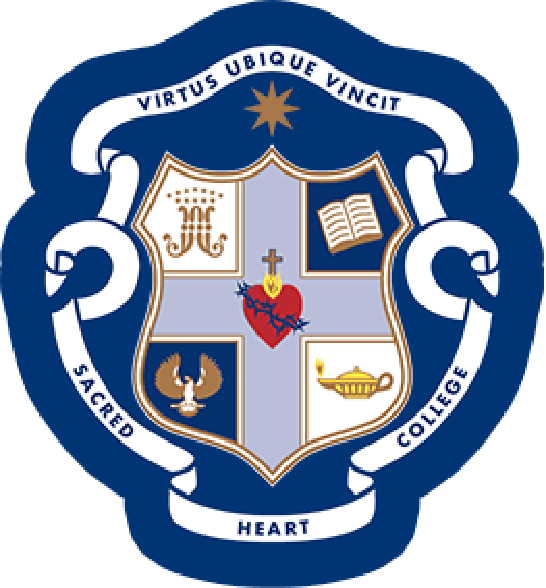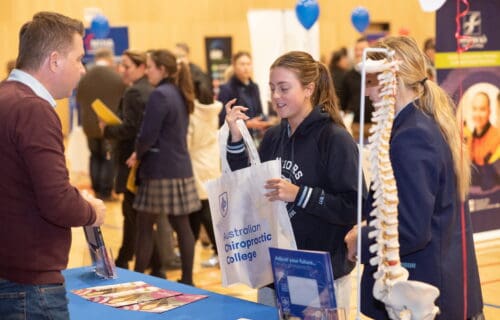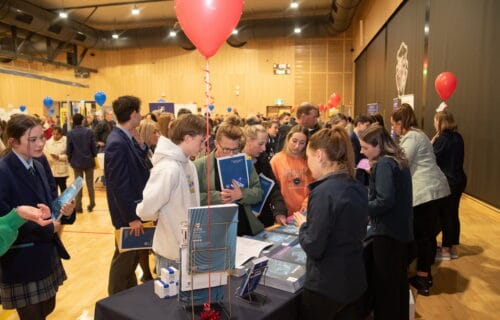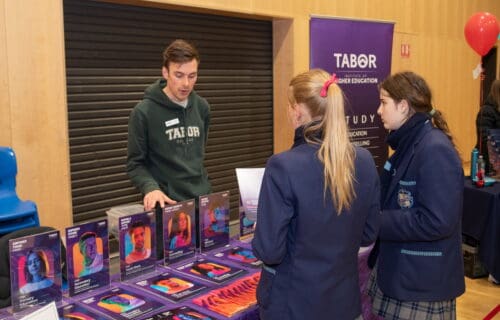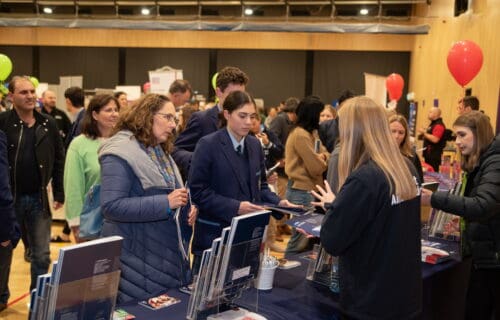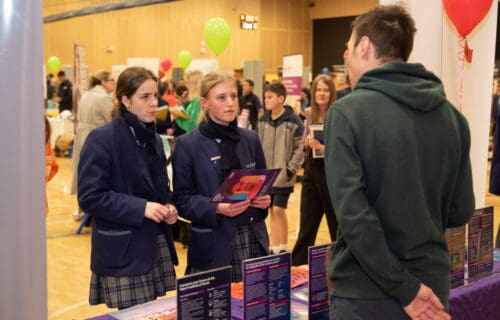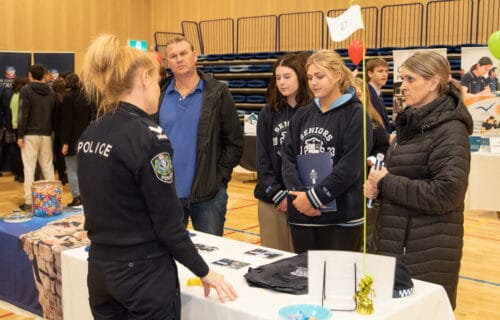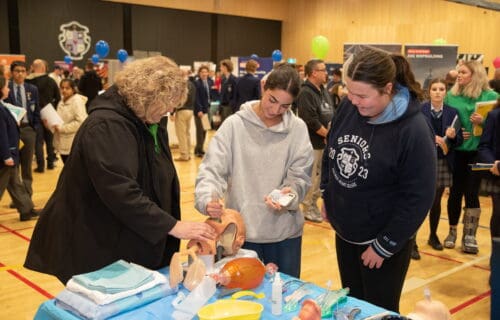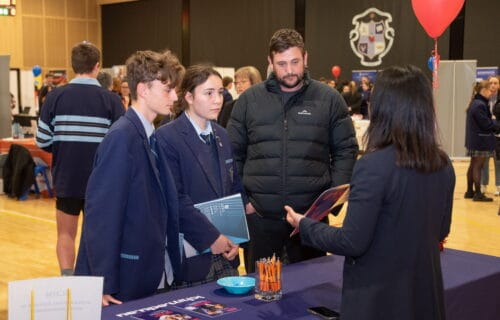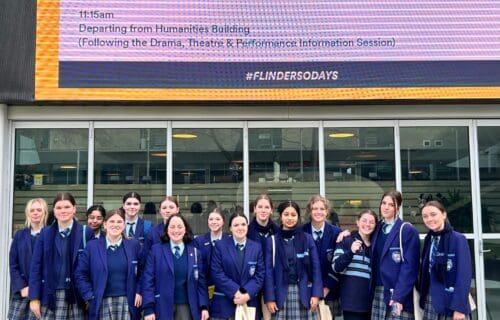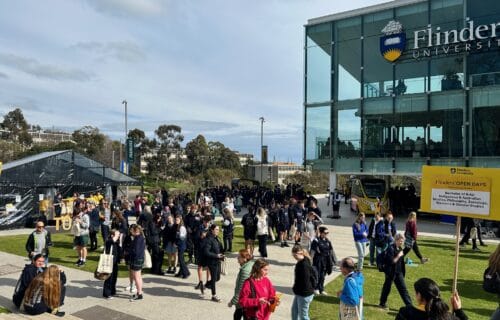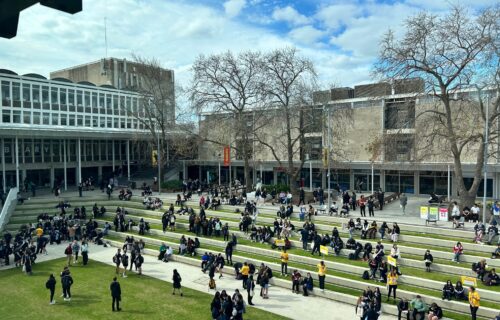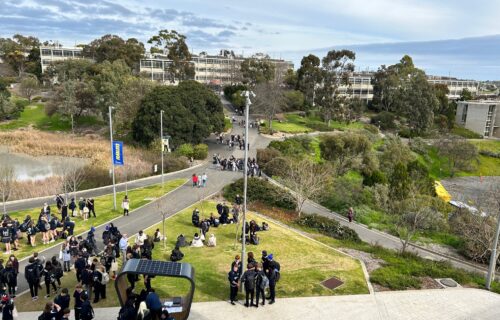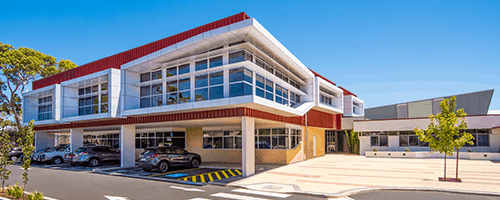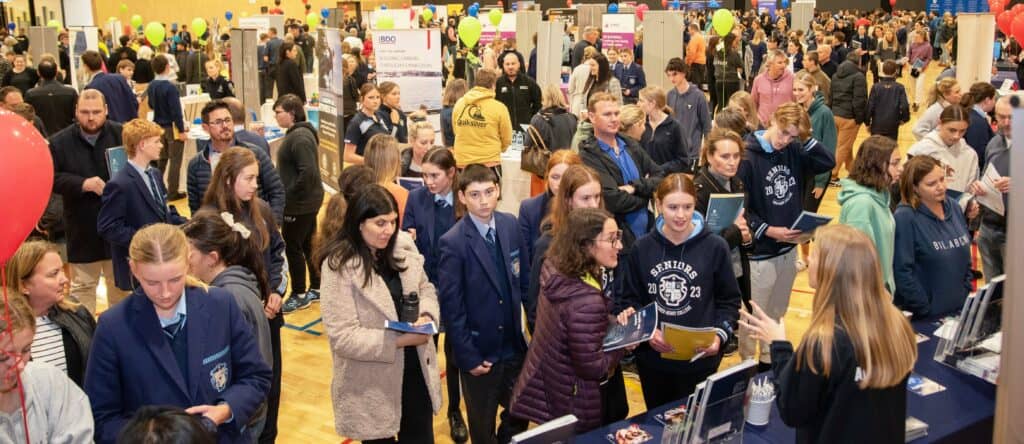
The SHC Careers & Pathways Expo was held in-person for the first time since 2019.
To our Sacred Heart College community
SHC Careers & Pathways Expo success
The 2023 Sacred Heart College Careers and Pathways Expo was our first post-COVID event in-person since 2019, and we were thrilled with the attendance of students, parents/caregivers, and the wonderful support of attendees from various educational institutions, industry and businesses. Following are quotes from exhibitors, which are reflective of the general feeling of those involved:
“What a fantastic event! We had so many great conversations with the students and their families. The only feedback from us would be for the Expo to run a little longer to try and combat the long lines we had at our table. Thank you so much for the wonderful food beforehand!” – UniSA
“After speaking to my team last night we all felt that the Expo last night was one of the best we have been to (and we attend a few) in terms of the numbers and engagement from students and parents. Congratulations on a successful event.” – BAE Systems
“Thanks for hosting the event; we had some very positive interest from your students. I think the event benefitted by being relatively short compared to some others; it created a positive atmosphere, and the parents and students were very focused.” – Australian Chiropractic College
“Thank you for hosting us last night, Emma and I had a lovely time. Your community is wonderful and we spoke to many polite, eager and pleasant students and their families. You absolutely do a careers night perfectly.” – Hessel Group
“It was a very well organised Expo and yes, there was a lot of positive interaction. Usually school expo’s tend to go too long, however, in this case I think it wouldn’t hurt to run it for just another 30 mins longer. A few of us were discussing how an hour went quickly, but 2-3 hours is too long.” – MAS National
“This was easily one of the best events I’ve done recently in terms of organisation and turnout.” – Hartwig Air
In addition, we also found that students and families were very appreciative of the opportunity to visit Sacred Heart College and have access to a broad range of information to contribute to their decision making about post school pathways. In particular, it was great to hear of students who came along with one particular idea in mind and left with a greater insight into what other things might be possible.
Thank you to all who assisted with the smooth running of the event, especially Annemarie Honner (Careers & Learning Enrichment Support), who in true Marist fashion, quietly makes things happen.
Key dates
-
Work Experience for 2023
BEFORE CONSIDERING WORK EXPERIENCE, PLEASE BE AWARE OF THE FOLLOWING:
It is a legal requirement that prior to commencing Work Experience students are inducted in the following areas: Work Health and Safety Act 2012 SA, Children and Young People (Safety) Act 2017 SA, Equal Opportunity Act 1984 SA, Child Safety (Prohibited Persons) Act 2016 SA and Fair Work Act 2009 (Cth).
Adequate time (approximately 5 hours) should be allocated to cover these topics effectively and students need to demonstrate their understanding. This induction is done by the school and is consistent with our Duty of Care to ensure that no student is placed where they may not be safe physically or psychologically.
In addition to this, the Work Experience form must be signed by the student, work placement provider, parent/guardian (all arranged by the student) and finally the principal or delegate (arranged by the school). The original Work Experience Agreement form then becomes a legal contract which sets the school insurance cover in place and must be retained by the school.
The school must also provide a contact person who is responsible for each student for the duration of their placement.
Work Experience is a very valuable opportunity for most students however, it does take time to ensure that the above expectations are met. We are happy to accommodate students in the times allocated. Please do not cause yourself or the College embarrassment by making other arrangements and then asking for exceptions to be made.
Students who wish to do Work Experience during 2023 are advised that the dates are:
9 – 13 October
Deadline for paperwork: 1 September20 – 24 November (Optional Work Experience Year 12s only)
Deadline for paperwork: 20 October4 – 8 December
Deadline for paperwork: 3 NovemberPlease note this is general Work Experience only. Students undertaking a VET program will need to organise their VET work placement with the VET Office.
-
AIE Industry Experience Days
4 October, 2023
AIE’s Industry Experience Day is a great opportunity for students in Years 10, 11 and 12 to learn about the local and international game development, 3D animation and visual effects industries.
Students will get the opportunity to learn about the different pathways to get into the industry, what should be in a portfolio and will be able to get creative in practical workshops using industry-standard 3D animation and game development tools.
The sessions are run by industry professionals who have worked on some blockbuster games and films. Everything is provided for you to participate in the hands-on workshops and you will be using the same software that is used in the industry.
Find out more here.
-
Enter the World of Le Cordon Bleu – Career Residential, Adelaide
4 October – 6 October, 2023
Le Cordon Bleu are opening their doors to high school students in Years 11 and 12 to experience a ‘day in the life’ at one of the world’s leading culinary and hospitality institutions to provide a taste of what a future career in global hospitality will be like.
Meet lecturers and Le Cordon Bleu professionals, hear from industry experts, discover what Le Cordon Bleu hospitality management degree programmes involve and experience hands-on culinary arts with their chefs.
Find out more here.
-
Sony World Photography Awards Youth Competition
Competition open until 5 January, 2024
The brief for this year’s Youth competition is ‘Through Your Eyes’. What is your (and your generation’s) perception of the world? From your family to the local environment to your day-to-day life, show them what – through your eyes – are the subjects and themes you want to photograph and share.
Whatever the genre, technique or subject matter, they want to see your photographs. You can enter up to three images for free.
Find out more and enter here.
-
Torrens University Australia Bright Awards
Entries now open, and close 3 September, 2023
A celebration of creative Year 10, 11 and 12 students, the Bright Awards recognise up-and-coming designers and support the future of the arts in high schools across Australia.
Whether you’re just tapping into your talent or keen to show off your well-developed skills, Billy Blue College of Design’s Bright Awards give you the chance to have your work recognised by industry experts. Plus, monetary prizes for both students and schools go towards kick-starting creative dreams.
What’s on offer? By entering the Bright Awards, you could win:
- A Category Finalist spot, earning yourself $1,000 plus a complimentary Creative Cloud licence from Adobe.
- All Category Finalists are then put forward, where one could win the Pinnacle Award in Creativity & Innovation Excellence earning a further $1,500, a scholarship to study design and creative technology, and $5,000 for your school.
They’re looking for original ideas, demonstrated research and planning which results in a quality submission. They would love to see how your creative submission has been considered from a social, environmental or economic perspective too.
Find out more and enter here.
Tertiary updates
Flinders University Open Day
Open Days are traditionally held in August and are a great way for students to go on campus and get a feel for what tertiary life might be like.
On Friday, 11 August we spent the day with a group of Year 11 and 12 students who were able to attend various information sessions about the different undergraduate degrees on offer at Flinders University. The students were also able to take part in various activities and displays presented by the different faculties at the University and gathered some really useful information to help them with future decision making.
The University goes to a great deal of trouble to make the on-campus experience exciting, informative, fun and engaging for all who attend. There were a myriad of secondary school students there as well as interested members of the general public. The atmosphere was very positive and welcoming, and the students really enjoyed themselves. As you can see from the following quotes, they gained some positive insights from it:
“I really enjoyed being on campus and experiencing uni life for a day.“
“Getting a feel for what university is all about and learning about all the possible pathways.“
“Talking one on one with professors about ideal pathways for different degrees.“
“Learning about different pathways into degrees.“
“I enjoyed talking to past and present students, while meeting lecturers and finding connections between courses of interest.“
“I enjoyed the presentations with the lecturers. There was a lot of information.“
“The presentations helped me make a decision about what I possibly may want to do. I loved the library and I found the lectures engaging and interesting.“
-
Applying to University for 2024
The online process for applying to Undergraduate University courses around Australia and South Australia in particular has now opened.
For Year 12 students wanting a Uni pathway the application process is quite straightforward and is done through the SATAC (SA Tertiary Admission Centre) website for SA courses and programs.
To avoid late fees students need to submit their application by 29 September 2023.
Key dates for the Undergraduate application process are available here or on page 27 of the Green SATAC booklet which all students should have received.
Any student who would like some assistance with the process are more than welcome to contact myself via email pruewilkosz@shc.sa.edu.au or to call into the Careers & Pathways Office.
-
Flinders UniTest at Sacred Heart College
Any Year 12 students who are thinking of applying to a Flinders University course and are slightly concerned about achieving the required ATAR should register for the Flinders Unitest which is free and multiple choice.You do this by physically visiting the Careers Office and registering your name and details.The test will be held at the school on Monday, 18 September between 12.30-3pm. This is the only time that it will be offered at SHC.The Flinders Unitest is a multiple choice general knowledge test that takes up to 2 1/2 hours and is completed online. You can either use 100% of your score plus SACE completion for stand alone entry to all Flinders University courses except Medicine. Alternatively, if it is a better outcome for you they will use 60% test result and 40% ATAR. There is no disadvantage to you if you dont do very well.There are fliers available in the Careers Office or you can go to this link, where you can also find practice questions. Although there is no need to practice for the test.
Spotlight on careers
-
Interested in Sports? Consider these careers…
If you eat, sleep, and breathe sports, then you might be considering a career in your favourite field. Right off the bat, most people think, “Great – I’m going to be a professional golfer or a football star.” And while those professions are undoubtedly exciting, they can be difficult to attain. Luckily, they aren’t the only options out there. In fact, careers in sport are just as diverse as the games themselves, with options that include administration, sports science, journalism, and more. So let’s explore some exciting sports-related career paths you might like to consider.
Sports Journalist
If you have a passion for both sports and writing, sports journalism might be right up your alley. As a sports journalist, you could cover everything from local competitions to professional sports. Plus, you can choose from many different mediums, including print, television, radio, or digital platforms.Sports Agent
If you’re a savvy negotiator and enjoy managing relationships, consider becoming a sports agent. An agent’s role is to represent the interests of athletes, assist with contract negotiations, and offer career advice.Sports Psychologist
If you love understanding the human mind and how it affects performance, a career in sports psychology could be for you. In this field, you’ll work on improving athletes’ mental health and helping them hone their focus, dealing with performance anxiety, and even overseeing their recovery from injury.Coach
Do you have a deep understanding of your sport and enjoy teaching others? Coaching is a fantastic route. As a coach, you could work with athletes of all ages. Your responsibilities would extend far beyond the playing field, to mentoring and guiding athletes toward their goals, both on and off the field.Fitness & Nutrition Advisor
With an interest in sports, you’re likely familiar with the importance of proper diet and exercise for optimal performance. As a fitness and nutrition advisor, you’d have the opportunity to guide and instruct athletes on how to maintain a balanced diet and perform exercises that would cater to their specific sports.Sports Physician or Physiotherapist
Do you have an interest in medicine? Combining that with a love for sports could lead down a rewarding path. Sports physicians and physiotherapists work to treat and prevent injuries in athletes and assist them in their recovery process.Sports Event Planner
Behind every major sports event lies a team of experts ensuring the program runs smoothly. As a sports event planner, you would coordinate the logistics and manage event operations – a great choice for those with strong organisational skills and attention to detail.Even if you don’t make your career on the playing field, there are still so many ways to carry your passion for sports into your professional life. Using a blend of your passion for sports, your knowledge, and your skills, the possibilities are just about endless.
Interesting stuff
-
Career advice from a former US President, Barack Obama
Sometimes when trying to think about career pathways, students can get overwhelmed by choices and the different things that they might hear about making career decisions. The following message does send a very simple direction to consider.
When former US President, Barack Obama was asked to share his most important career advice for young people he replied…“Just learn how to get stuff done.” It’s a simple answer but underlines the fact that you can talk about things all day, but the power lies not in what you say but in what you do. You can see more of what he had to say in this Youtube video here.
Don’t wait to finish school to get experience
You don’t need to sit around and wait until you’ve finished school to start getting experience, building skills, and making connections for your future. There are lots of things you can do alongside your schoolwork.Let’s take a look at some of your options.
Part-time work
This is something a lot of students already do. Finding a part-time or casual job is an excellent way to start building valuable skills, learning about the world of work, and even making important connections for the future (plus you get to earn some money too).You don’t need to give up a lot of time for a job. It could be a few hours a week, either after school or on the weekend.
If you’d like to know whether you’re ready to start work, talk to your parents/carers and think about jobs you might like to do.
Start a business
Not too keen on working for someone else? If you have the initiative – and a great idea – you might like to start your own business.You’re probably not going to become a millionaire overnight, but with some dedication and time you might be able to grow your business into something special.
Volunteer
Volunteering is a great way to develop important work and life skills – and it looks great on your resume or uni applications too.Sure, you might not be getting paid, but what you get back in experience is more than worth it. Volunteer work might even lead to a paid role down the track, if you show some initiative.
Get work experience
If you already have a career or industry you’re interested in, a great way to solidify that interest is through work experience. It’s a great way to get a taste of working life, and can help you narrow down your future choices.Plus, it’s another way you can learn useful skills and make future contacts.
Refer to the work experience article in this newsletter.
Start networking
You don’t need to wait until you’re in the workforce to start networking – you can do it now. Try and get to know some of the big names in your industry of choice. You might even like to try and reach out to them for some advice, whether it’s in person or via social media.Find a family friend or other trusted adult who has a job you’d love and ask them all about it.
You might even be able to attend certain industry events to start meeting people and getting your name out there.
Try a microcredential or MOOC
You probably don’t have tons of extra time on your hands for even more study. Not to worry – this is where microcredentials and MOOCs (massive online open courses) come in handy.These bite-sized learning opportunities are a perfect way to upskill and gain new knowledge quickly and easily.
Microcredentials are short certification courses that allow you to learn new professional skills reasonably quickly because of their length. They can be an alternative learning option for those who don’t have the time or money to enrol in a longer qualification.
Read more about MOOCs here.
Hobbies
Learning can be fun too! Hobbies can help you build a huge variety of useful skills, from mindfulness to motor skills, as well as improving your focus and mental health. -
Jobs for people who love puzzles
Puzzles can be toys, games, or problems that are designed to test your ingenuity. From jigsaw puzzles and computer games to crosswords and sudoku, there are lots of different ways you could be entertained by a great puzzle.
But there’s more to puzzling than just fun. You can learn useful skills (puzzles are often used in educational settings), give your brain a workout, and you can even find careers where solving puzzles could be part of your daily life.
Useful skills you could get from puzzling
From early childhood onwards, puzzles are used as tools to help us to develop skills from finger strength and dexterity to visual-spatial skills and logic.There’s a heap of other great skills that you can learn and develop through puzzles too, they could be useful in lots of jobs and other aspects of your life and include:
- Resilience and perseverance
- Problem solving and reasoning
- Critical and analytical thinking
- Teamwork and collaboration
- Planning
- Focus
- Creativity
- Time management
- Adaptability.
All the above are wonderful skills to have. Taking part in competitions, joining clubs, and working on real world puzzles (or problems) could help you to build on these skills, gain new ones, and help to illustrate to others that you have these skills already. So don’t forget to add them to your resume and use examples in your interviews.
Jobs for people who love puzzles
You could incorporate puzzles into your career if you like to be challenged and love finding solutions where others may not be able to.Here are some examples of careers you could explore further:
- Mathematician
- Actuary
- Cryptographer
- Ethical Hacker
- Computer Support
- Network Engineer
- Archaeologist
- Forensic Scientist
- Police Detective
- Private Investigator
- Fire or Accident Investigator
- Software Engineer
- Auto Mechanic
- Interior Designer
- Puzzle Maker
- Psychologist
- Counsellor
- Software Developer
- Teacher
- Architect
- Journalist
- Data Analyst
- Air Traffic Controller
- Structural Engineer
- UX Designer
- Cybersecurity Officer
- Programmer
- Doctor
- Event Planner
- Author.
-
How to stay focused while studying
It can be hard to stay focused when studying. From the itch to check Instagram to staying comfortable in your chair, there can be lots of distractions keeping you from getting the job done. Luckily, there are plenty of tools and tricks out there that can help you stay focused and study hard – here are some of these methods.
Find a suitable environment
Some people find it easiest to study in complete silence, while others might like a bit of background noise. Try some different places around the house, or even in your favourite coffee shop, to see what works best for you.Regardless, there are some things that you need to have no matter where you are:
- Plenty of space and a flat surface for all your materials and tools
- An outlet to charge your devices – there’s nothing worse than your battery going flat in the middle of writing an assignment when you haven’t saved for a while!
- A comfortable chair or standing position.
Create a study ritual
Help yourself get into the mindset of study by creating a little ritual for yourself that you follow every day. Maybe you can clean your desk before you start, or go for a short walk. Having this ritual can help prepare your mind for the study to come.Block distracting websites and apps
We’re all guilty of being distracted by our Facebook or Instagram feeds when we’re supposed to be doing something else. But if it’s becoming a bad habit, it might be time to step it up and block those websites and delete the apps from your phone. It might be tough, but it will do wonders for your study!Divide up and space out study sessions
Got lots of study to get through? It can seem daunting when you add it all up together. Make it less scary by dividing up your time into smaller, more manageable blocks, instead of trying to cram everything in at once.Find the best tools
There are tons of apps and websites out there designed to help you get the most out of your study sessions. From helping you get organised, to helping you focus, to build good habits, there’s something for everyone. Here’s a few that could help you to get started:Focus on skills, not grades
Learning is a skill that will last you a lifetime. Remember that while it might be important to do well on your exams and assignments, it’s not the be all and end all. Building valuable study skills is important too – and feeling like you’re accomplishing something just by learning can be very motivating.Schedule downtime
You don’t have to be a study machine 24/7 – in fact, trying to cram everything in non-stop will probably be more harmful than good. Make sure you have some time to relax, unwind and take care of yourself as well. It will improve your learning in the long run.Exercise
Studying can involve a lot of sitting, and it’s important that you get up and move. Even if it’s just getting up from your chair every 30 minutes to stretch and walk to the fridge, something is better than nothing. Exercise doesn’t just benefit your body – it can help reduce stress and anxiety and help you to focus better as well.Review and adapt
Tried something that you found just wasn’t working? That’s okay! Adapting to your changing schedule and needs is important, so make a list of tips and techniques you found worked wonders, and things that didn’t work so well. Review your list over time to see if things need a bit of a shake-up. -
Volunteering ideas – where can you start?
Volunteering is a great way to develop important work and life skills – and it looks great on your resume or uni applications too.
Sure, you might not be getting paid, but what you get back in experience is more than worth it. Volunteer work might even lead to a paid role down the track, if you show some initiative.
If you’ve been thinking about volunteering, that’s great! There are heaps of places out there that are always looking for keen helpers, and many of them welcome volunteers from ages 16+.
Before we get into some places where you might like to volunteer, let’s have a quick look at the benefits of volunteering.
What’s in it for you?
Well, you won’t get rich financially – but you’ll get rich in many other ways:- Experience
- Learning new skills
- Reduces stress
- Combats depression
- Mentally and/or physically stimulating
- Provides a sense of purpose
- Helps other people
- Makes you feel better about yourself
- Great for your resume
- Benefits your community
- Make new friends
- Network
- Challenging
- Fun.
Whatever your motivation for volunteering and no matter what your interests are, there will be a way you can get involved with something that matters to you, and that will also make a positive difference to you.
Skills you could gain or improve on
Include but not limited to:
- Industry-related skills
- The ability to work in a team
- Leadership
- Problem solving and adaptability
- Communicating with clients and stakeholders
- The ability to plan and prioritise work
- Sales skills
- Time management
- Report writing
- Improved interpersonal skills.
Not sure where to start?
Here are some ideas for ways you can volunteer your time:Environmental initiatives
- Participate in community clean-up events.
- Join a local tree planting or gardening project.
- Assist in wildlife conservation efforts.
Mentoring and education
- Tutor students in subjects you excel in.
- Teach workshops on specific skills (e.g., coding, art, cooking).
Aged care
- Visit nursing homes to spend time with and support the elderly.
- Assist with organising social activities for seniors.
Homelessness and hunger
- Volunteer at a local food bank or soup kitchen.
- Distribute food and essential items to homeless individuals.
- Help organise donation drives for clothing, blankets, and food.
- Animal welfare
- Volunteer at an animal shelter or rescue organisation.
- Foster animals awaiting adoption.
- Assist with pet adoption events.
Healthcare and support
- Offer companionship and assistance to patients in hospitals or hospices.
- Volunteer for crisis hotlines or support groups.
- Help organise blood donation drives.
Disaster relief
- Join disaster response teams to provide aid in emergencies.
- Volunteer with organisations that provide relief to disaster-stricken areas.
Arts and culture
- Volunteer at local museums, galleries, or cultural events.
- Assist with organising and promoting arts-related programs.
Housing and construction
- Join community projects to build or repair homes for those in need.
- Volunteer with organisations that provide housing assistance.
Digital volunteering
- Offer virtual tutoring or mentoring sessions.
- Help non-profits with website design, social media, or graphic design.
Social activism
- Volunteer with organisations working on human rights, equality, and social justice.
- Engage in voter registration and education campaigns.
Language and cultural exchange
- Help newcomers learn the local language and culture.
- Participate in language exchange programs.
Sports and recreation
- Coach youth sports teams or lead fitness classes.
- Assist with organising local sports tournaments or events.
See more about volunteering ideas in this newsletter.
Disclaimer: Statements on careers and courses included in this newsletter are not necessarily those of Sacred Heart College. i.e. The text of notices on courses and industry prospects may be taken directly from their correspondence/publicity material. Some material taken from Study Work Grow (South Australia Careers News).


